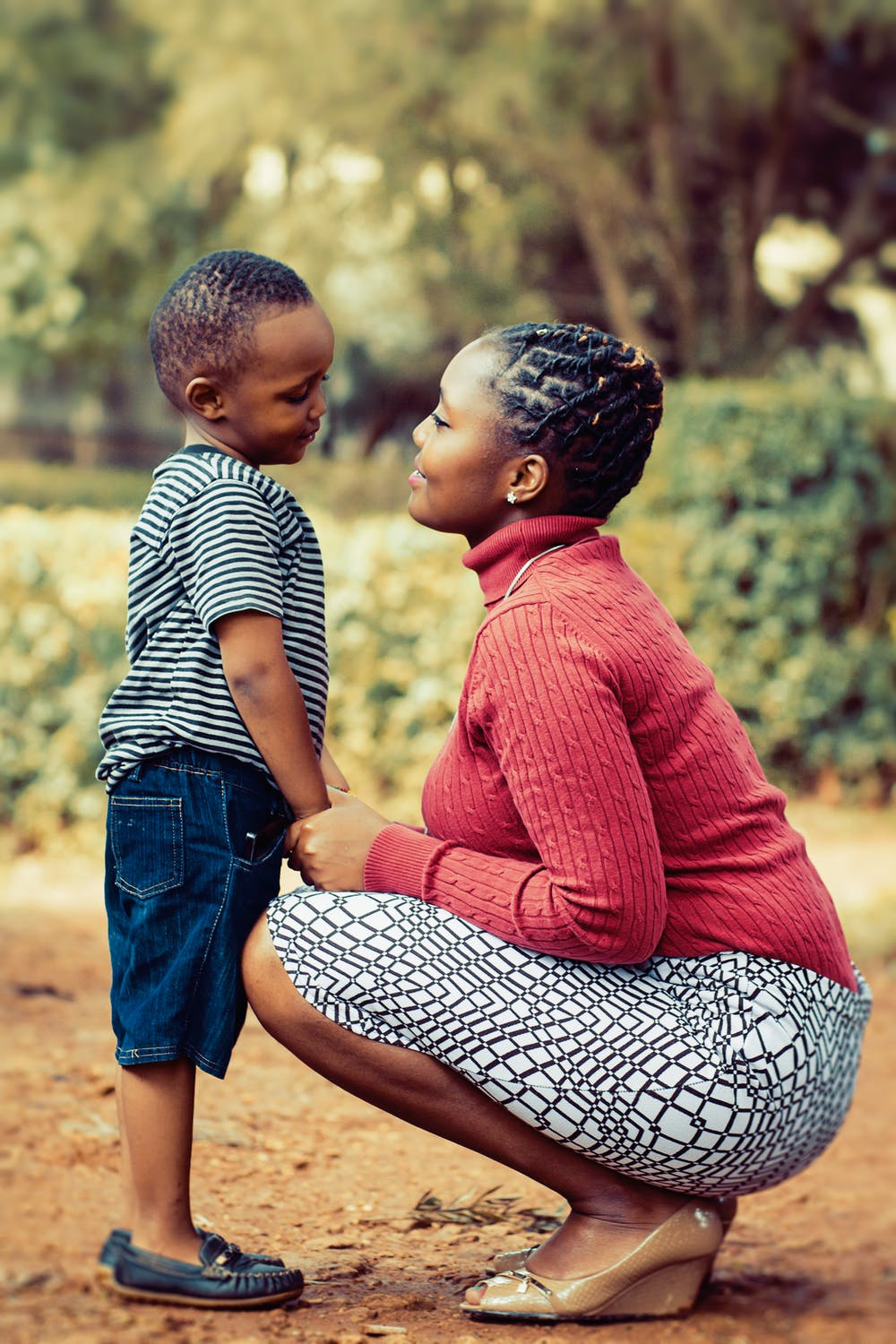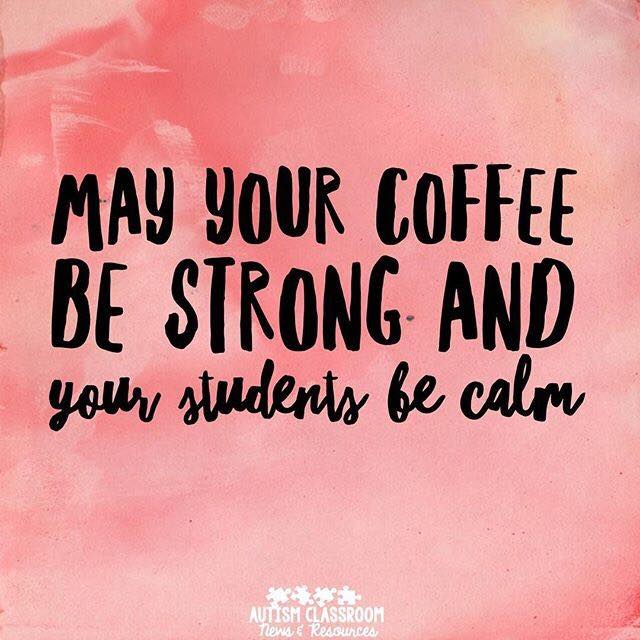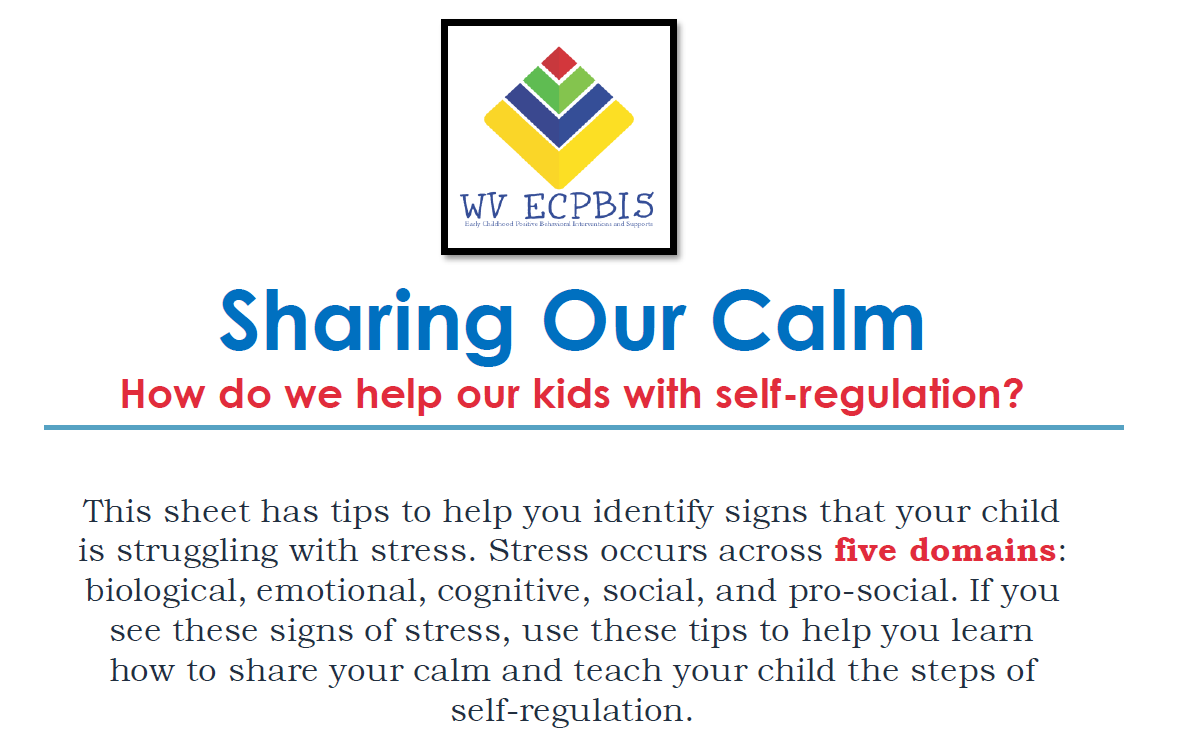For Families
How to Help Your Child with Self-Regulation
Sharing Our Calm
This sheet has tips to help you identify signs that your child is struggling with stress. Stress occurs across five domains: biological, emotional, cognitive, social, and pro-social. If you see these signs of stress, use these tips to help you learn how to share your calm and teach your child the steps of self-regulation.
Incorporating ECPBIS Features at Home
Promoting skill development at home and in public

Set Expectations at Home
If your child's teacher is implementing ECPBIS, they are incorprating a set of classroom expectations. Examples of expectations include Be Respectful, Be Responsible, and Be Safe. Students are taught what these expectations look like in different school settings (classroom, cafeteria, playground, etc.). You can adapt these expectations at home and when in public.
For example, teach your child what it looks, sounds, and feels like to Be Respectful at mealtime, Be Responsible at bedtime, or Be Safe at the grocery store. Refer to these expectations often and acknowledge your child when they meet them.
This website shows examples of expectations and what they look like at home.
Set Routines at Home
Most children respond well to routine and structure. Classrooms implementing ECPBIS will have a daily schedule posted, and it will be referred to throughout the day.
You can create your own daily schedule for weekends or holidays. You could also develop a routine for times of the day that are difficult for your child, like at bedtime, in the morning, or during mealtime.
The Association for Positive Behavior Support has released this list of Behavior Support Strategies at Home, including expectations and routines.

Talk about Emotions
Children need support in identifying and responding to their own emotions. Help your child build a vocabulary about the wide array of emotions they can experience by labeling the different feelings they display. Let your child know that feeling these emotions is okay and they happen to everyone - it's what we do in response to our emotions that matters most!
Support your child in finding positive ways to express and deal with their emotions, especially the difficult ones such as anger, fear, and disappointment.
Find opportunities to label your own emotions in order for your child to see what the emotion looks like in someone else. Talk with your child about how you respond to this feeling.
Read Children's Literature
Children's literature can be a very effective and useful tool for teaching social skills. Talk about the emotions the characters seem to be feeling in the story. Ask your child how they know the characters feel this way.
Once your child is able to identify the emotions felt by characters in the story, you can ask them what might have caused the characters to feel this way. This approach helps children understand and respond to the emotions of people around them.
Helpful Resources
National Center for Pyramid Model Innovations
Check out the Backpack Connection tab on the NCPMI Family Engagement page for support on addressing behavior, emotions, routines, and social skills.
WV Family Engagement Center
The WV Family Engagement Center Twitter feed keeps you up-to-date on webinars and other free online resources to support your child in becoming a lifelong learner.
Center on PBIS
The Center on PBIS has published a practice brief for supporting features of positive behavior interventions and supports at home. Click "Download File" to view the document.
Resources Developed by Staff
Check back frequently for updates!

Videos
The Pyramid Model at Home with Amy Carlson
You Can't Make Me Book Review with Sara Smouse
Stop, Think, Act... Book Review with Jess George
Positive Mindset Habits Book Review with Amy Carlson
Using Tucker Turtle at Home with Sara Smouse
Behavior Connections Between Adults and Children with Amy Carlson
Emotional Regulation with Jess George
Self-Regulation with Jess George
Expectations and Rules at Home with Jess George
Acknowledging Children When They Meet Expectations with Jess George
Tips for Teaching Emotions with Sara Smouse
Early Childhood Transitions with Sara Smouse

Book Studies
Stop, Think, Act: Integrating Self-Regulation in the Early Childhood Classroom Book Study by Jess George
You Can't Make Me Book Study by Sara Smouse
Children's Lit Kits
You Will Be My Friend! Lit Kit assembled by Jess George
Bear Feels Scared Lit Kit assembled by Sara Smouse
Waiting Is Not Easy! Lit Kit assembled by Amy Carlson
The Little Mouse, The Red Ripe Strawberry, and The Big Hungry Bear Lit Kit assembled by Jess George

Visuals and Infographics
Transition Back to School - tips for supporting children as they transition back to school following blended delivery or an extended break
Coaching During Covid - tips for supporting teachers implementing the Pyramid Model while Covid-related guidelines are in place
ECPBIS Readiness Flyer - information on the ECPBIS Readiness Series
Anchors Aweigh - tips for families as they support their children in transitioning to pre-K or kindergarten
Sharing Our Calm - tips for families to assist their child with self-regulation
Back to School Kit - forms, checklists, and documents you need to help plan a successful start to the new school year
Open House Ideas - tips for introducing the Pyramid Model to families






